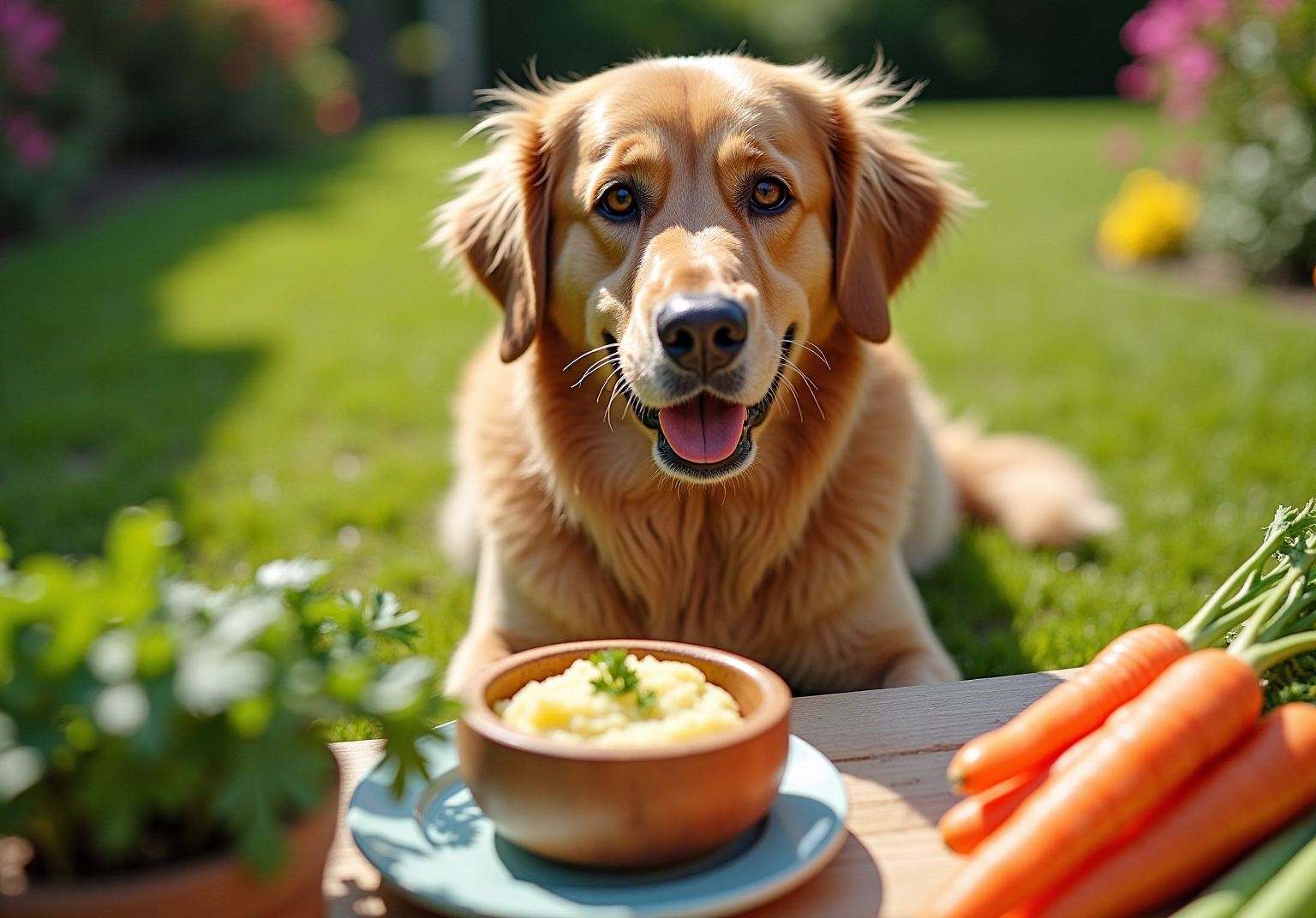
Are Potatoes Good for Dogs? Comparing Nutritional Benefits
Overview
As pet owners, we always strive to provide the best for our furry companions, and potatoes can indeed be a beneficial addition to their diet when prepared with care. They offer essential carbohydrates, vitamins, and minerals that can enhance your dog’s overall nutrition.
However, it’s crucial to be mindful of how they are prepared to avoid the risk of solanine toxicity, which can be harmful. While incorporating potatoes can be a nutritious choice, they should never replace the balanced diet that primarily consists of proteins and fats, which are vital for your dog’s health.
Remember, your pet’s well-being is our top priority, and understanding the right way to include such foods is a step towards nurturing their happiness and health.
Introduction
As devoted pet owners, we often find ourselves deeply concerned about the nutrition we provide for our furry companions. The debate surrounding the suitability of potatoes in a dog’s diet has gained traction, reflecting our collective desire to ensure the best for our beloved pets. When prepared correctly, potatoes can indeed offer a wealth of vitamins and minerals, including essential nutrients that support energy levels and digestive health. However, it’s crucial to acknowledge the potential risks associated with improper preparation. This raises an important question: can these tubers truly enhance a dog’s overall well-being?
Navigating the complexities of canine nutrition can feel overwhelming at times. We want to make informed choices that contribute positively to our dogs’ health. As we consider whether potatoes are a valuable addition to our dogs’ meal plans, it’s important to weigh the benefits against the risks. By doing so, we can approach our pets’ diets with compassion and care, ensuring they receive the nourishment they need to thrive.
Nutritional Value of Potatoes for Dogs
When prepared with care, the question of whether potatoes are good for dogs can reveal several nutritional benefits for our beloved canines. They serve as a rich source of carbohydrates, providing energy, and are packed with essential vitamins like Vitamin C and B6, along with important minerals such as potassium.
However, it’s crucial to prepare these tubers properly before sharing them with our furry friends, as uncooked varieties contain solanine, a harmful substance that poses health risks. When well-prepared, these tubers can be a nutritious addition to a dog’s diet, which raises the question: are potatoes good for dogs, as they offer fiber that aids digestion and supports gut health?
Furthermore, their low-fat nature makes them suitable for dogs needing a balanced meal without excessive calories. While it is important to consider if potatoes are good for dogs, they should be offered in moderation and as part of a varied meal plan to ensure our dogs receive all the essential nutrients they need.
This approach aligns with the understanding that dogs do not have a nutritional requirement for starchy carbohydrates, and their diet should primarily consist of protein and fat for optimal health. By being mindful of these considerations, we can ensure our canine companions thrive and enjoy a well-rounded diet.
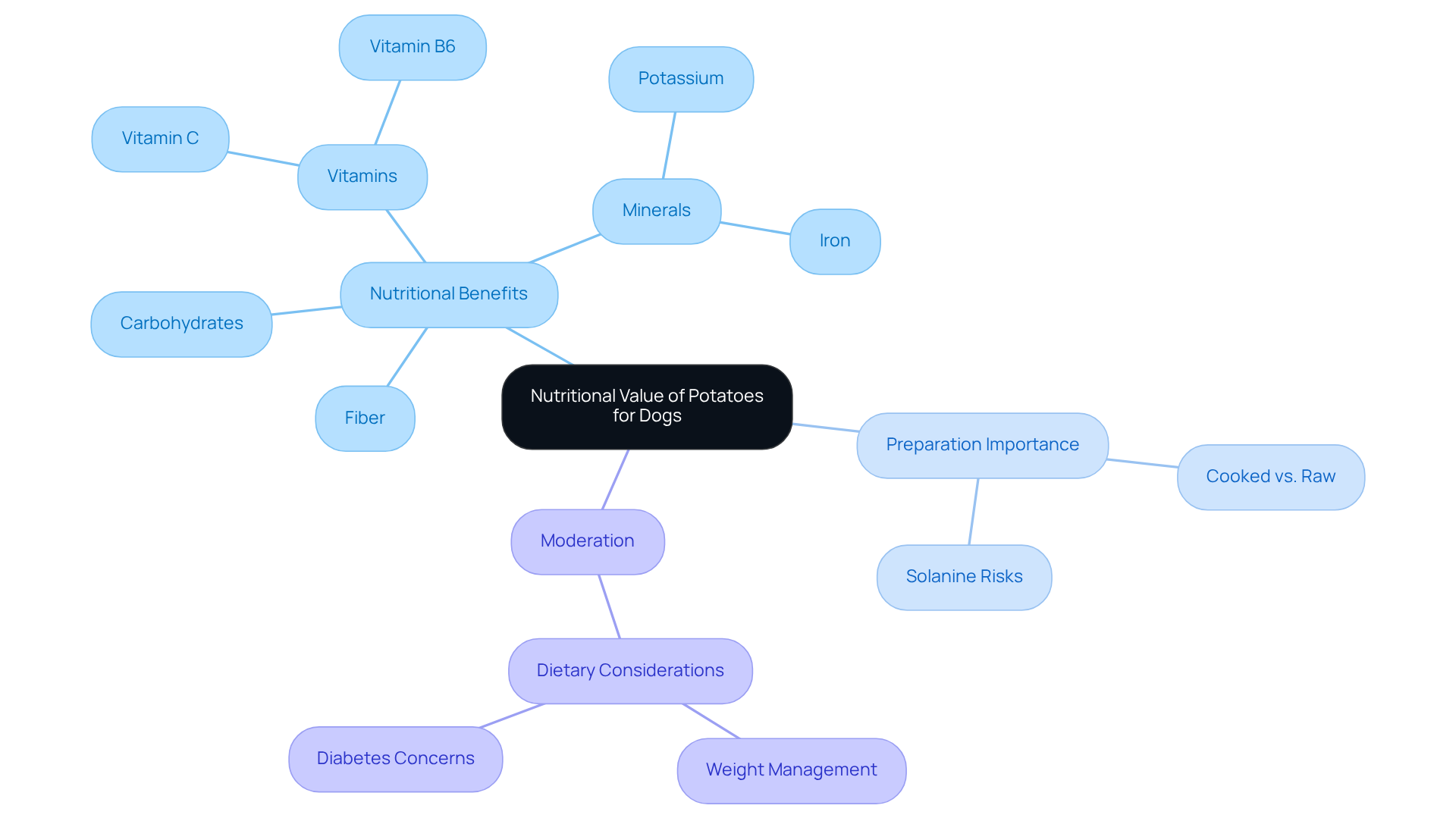
Potatoes vs. Other Common Dog Foods: Benefits and Risks
As pet owners, we often worry about the best nutrition for our beloved dogs. When considering tubers alongside traditional dog foods like kibble or meat-based diets, it’s essential to ask if are potatoes good for dogs. While potatoes can serve as a carbohydrate source similar to grains like rice or oats, many wonder, are potatoes good for dogs, as they also provide unique benefits. They are rich in fiber and packed with essential vitamins, which raises the question: are potatoes good for dogs’ health? Notably, tubers, including potatoes, are abundant in vitamin C, vitamin B6, potassium, and magnesium, which leads to the question: are potatoes good for dogs and can they enhance your dog’s overall well-being?
Moreover, tubers are highly digestible and provide good energy for our furry friends, which makes many wonder, are potatoes good for dogs? However, it’s important to remember that, unlike high-protein diets, tubers, including whether are potatoes good for dogs, do not supply sufficient protein, which is crucial for muscle growth and overall vitality. While many commercial dog foods are formulated to meet AAFCO standards, relying solely on tubers does not create a complete meal for your pet.
There are also risks associated with feeding tubers, such as potential allergic reactions in some dogs, which may manifest as hives, itching, upset stomach, or even difficulty breathing. Additionally, the toxicity of uncooked tubers due to solanine is a concern that cannot be overlooked. In contrast, high-quality canine diets typically incorporate a balanced mix of proteins, fats, and carbohydrates, ensuring that all of your dog’s nutritional needs are met.
In light of this, while tubers can be a beneficial addition—especially in grain-free meal plans—it’s important to ask, ‘are potatoes good for dogs’ before considering them as a replacement for a comprehensive and balanced dog food. It’s all about finding the right balance to keep your furry companion healthy and happy.
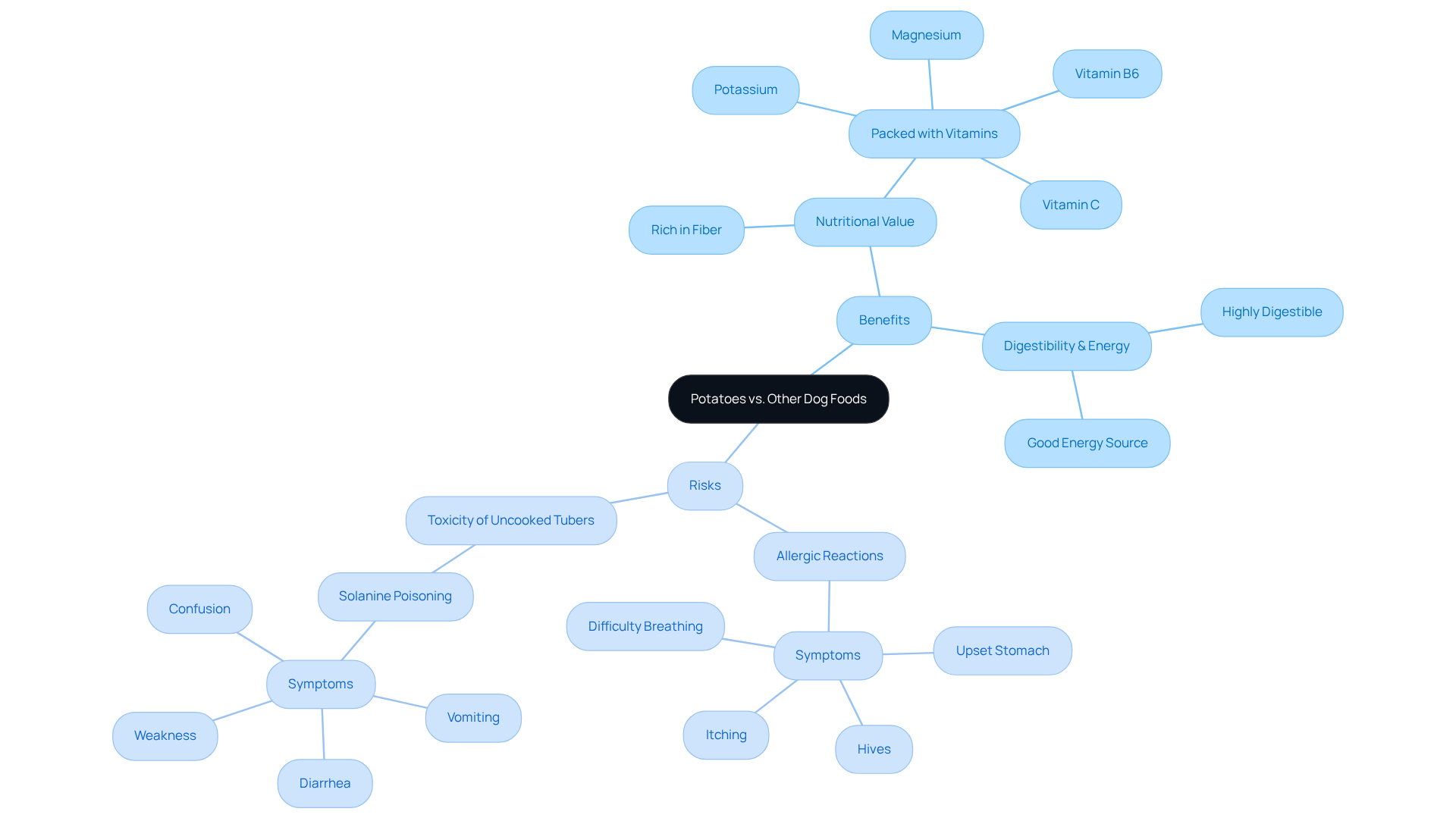
Safe Feeding Practices: Incorporating Potatoes and Alternatives
As a loving pet owner, you want to ensure that your furry friend enjoys a safe and healthy diet, which includes asking if are potatoes good for dogs. When considering if are potatoes good for dogs, it’s important to follow specific guidelines to protect their well-being. Start by preparing the tubers thoroughly—boiling or baking is the best approach—while avoiding harmful additives like butter, salt, or spices. By introducing small servings, you can carefully observe how your dog reacts, especially if they are not used to potatoes, to determine if are potatoes good for dogs. Be vigilant for any signs of solanine toxicity, which may manifest as vomiting, lethargy, or gastrointestinal distress.
To prevent choking hazards, consider:
- Mashing the tubers
- Chopping the tubers into small pieces
Additionally, for a more nutritious alternative, you might explore options like sweet potatoes, carrots, or green beans. These vegetables not only provide health benefits but also eliminate the risks associated with improperly prepared tubers. Remember, it’s crucial to evaluate whether are potatoes good for dogs, ensuring they do not exceed 10% of your dog’s daily caloric intake.
For personalized advice, consulting with a veterinarian or a pet nutritionist is always a wise choice. They can help ensure that any dietary changes align with your dog’s unique health needs and lifestyle. As Dr. Nade Georgieva wisely points out, ‘are potatoes good for dogs’ because they are a good source of carbohydrates, vitamins, and minerals for canines. They can provide energy and support a healthy immune system. By embracing these practices, you can enhance your dog’s diet while prioritizing their safety and well-being.
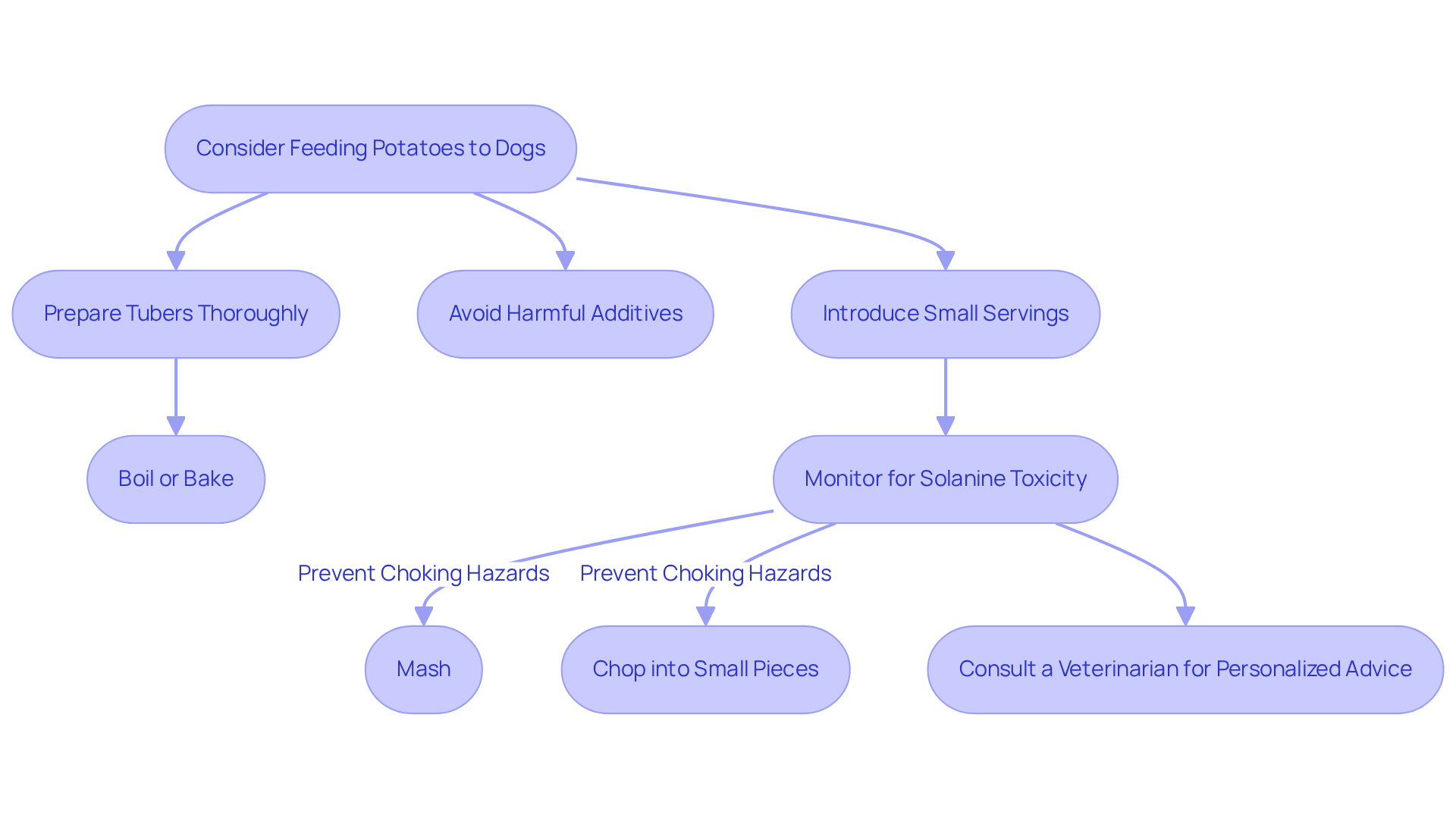
Conclusion: Making Informed Choices for Your Dog’s Diet
In summary, while tubers can offer nutritional benefits for our beloved canines when prepared properly, it’s important to consider if potatoes are good for dogs, as they should be viewed as a delightful addition rather than the primary source of sustenance. It’s essential for pet owners to understand if potatoes are good for dogs, consider their nutritional value compared to other canine diets, and implement safe feeding practices.
Research from the Association for Pet Obesity Prevention (APOP) reveals a concerning statistic: 55.8% of dogs are overweight or obese. This underscores the importance of balanced nutrition that meets all of a dog’s dietary needs. Moreover, the typical bag of grain-based dog food contains over 50 percent carbohydrates, which highlights the necessity of making informed dietary choices for our furry friends.
By prioritizing a balanced nutrition plan and being mindful of the potential risks associated with feeding potatoes, pet owners can help their companions lead healthy and joyful lives. Ultimately, making thoughtful decisions about diet plays a significant role in the overall well-being of pets, aligning beautifully with the luxury pet care philosophy that champions quality and individualized care.
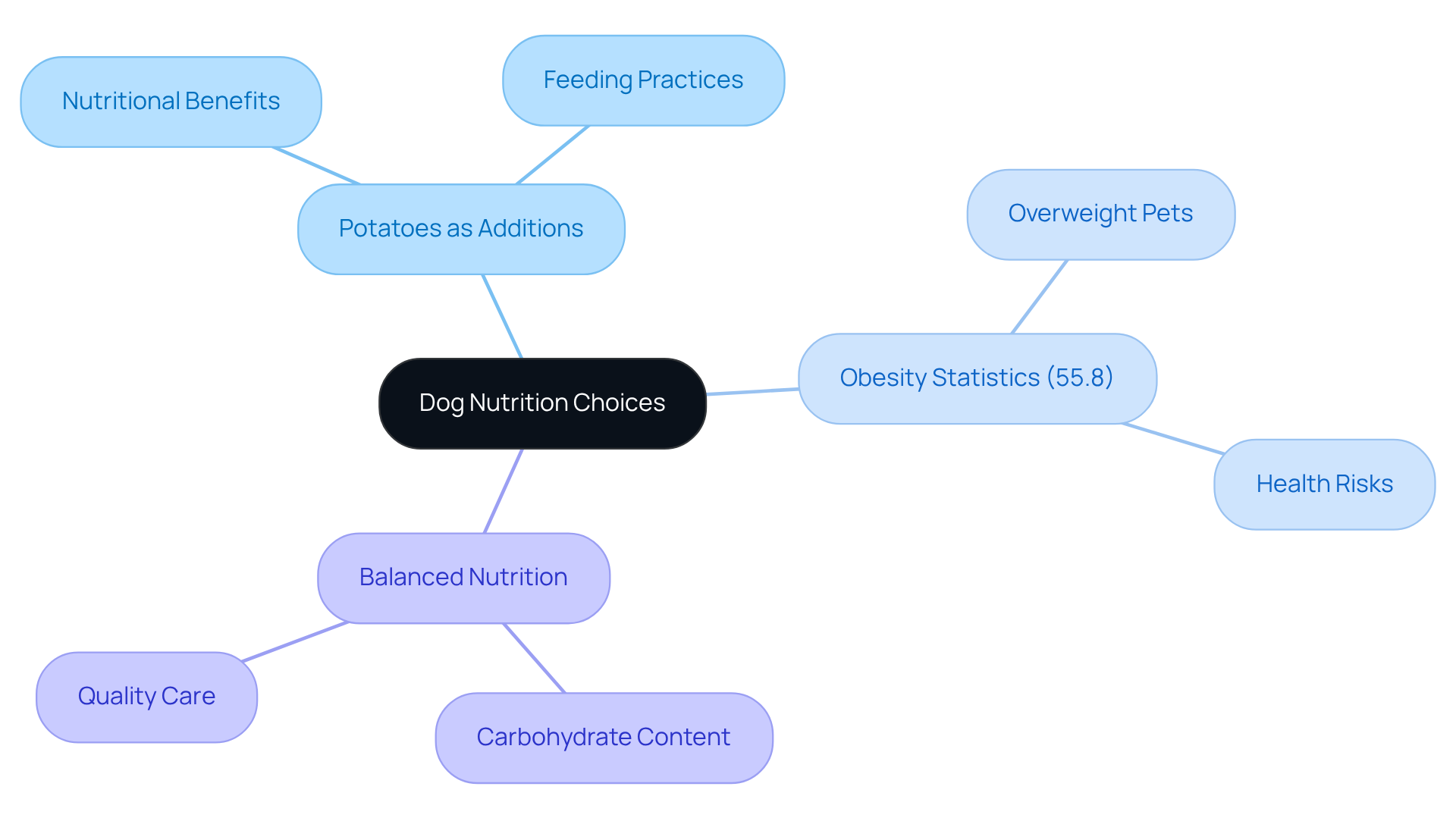
Conclusion
While potatoes can be a nutritious addition to your dog’s diet when prepared with care, they should not serve as the cornerstone of canine nutrition. It’s important to understand whether potatoes are truly beneficial for dogs by recognizing their potential advantages, such as providing essential vitamins, minerals, and carbohydrates. However, we must also acknowledge the significance of a balanced diet that prioritizes protein and fat.
This discussion highlights the nutritional value of potatoes, emphasizing their role as a source of energy and essential nutrients like Vitamin C and potassium. Yet, it is crucial to stress the necessity of safe preparation methods and moderation, considering the risks of solanine toxicity and potential allergic reactions. When comparing potatoes with other dog food options, it becomes evident that while they can complement a varied meal plan, they should never replace high-quality, protein-rich diets.
Ultimately, as caring pet owners, you are encouraged to make informed dietary choices that take into account your dog’s unique nutritional needs. Consulting with a veterinarian and exploring alternative vegetables can significantly enhance your dog’s overall health and well-being. By prioritizing balanced nutrition and safe feeding practices, you can ensure that your furry friends thrive, leading to happier and healthier lives. Embracing these principles supports the idea that thoughtful dietary decisions are key to fostering a strong bond with your beloved companions.
